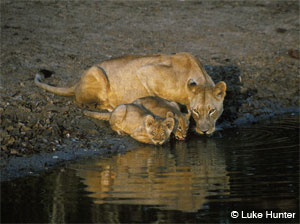Global Felid Conservation Genetics

Our collaboration with Panthera involves providing technical assistance, individual genotyping, collaborative research on genetic threats, collaborative research in molecular ecology, technical training, sample and data archiving, and a web based central source for related information relevant to global felid conservation. Our Comparative Genomics Laboratory uses the latest techniques in conservation biology to conduct critically important research and design conservation management plans. In most instances this program will attempt to fill in important missing gaps in areas for which data are necessary to make applied conservation management decisions. Also, the program will support molecular marker development for use by the community and provide technical assistance by training students and scientists from other programs at our “state of the art” laboratory facilities.
The Global Felids Genetic Program provides important assistant and information to various in-country programs such as, jaguar programs in Argentina, Belize, Bolivia, Brazil, French Guiana, Guatemala, Mexico, and Peru, tiger programs in Laos, Myanmar and Thailand, snow leopard programs in Afghanistan, Bhutan, Mongolia, and Tajikistan and leopard and lion programs in Asia and Africa.
For more information or to learn more about how you can participate in the program please visit Panthera.
Project Staff
Associate Director, Salisa Rabinowitz, Ph.D.
Post-doctoral Research Scientist UK-based, Cristina Pomilla, Ph.D.
Post-doctoral Research Scientist, Isabela de Macedo Gomes Dias, Ph.D.
Technicians, Simone Loss de Freitas Chaves, M.Sc., Rebecca Hersch, B.Sc.
Laboratory Manager, Ellen Trimarco, M.A.
Collaborators
Alan Rabinowitz, Ph.D., President and CEO, Panthera
Luke Hunter, Ph.D., Executive Director, Panthera
Collaborator Biosketches

Dr. Alan Rabinowitz graduated from the University of Tennessee in 1981 with an M.S. in zoology and a Ph.D. in wildlife ecology. He is currently the President and CEO of Panthera, a nonprofit organization devoted to saving the world’s wild cat species. Prior to Panthera, Rabinowitz served as Executive Director of the Science and Exploration Division for the Wildlife Conservation Society for nearly 30 years. Dr. Rabinowitz has traveled the world on behalf of wildlife conservation and has studied jaguars, clouded leopards, Asiatic leopards, tigers, Sumatran rhinos, bears, leopard cats, raccoons, and civets. His work in Belize resulted in the world's first jaguar sanctuary; his work in Taiwan resulted in the establishment of that country's largest protected area, its last piece of intact lowland forest; his work in Thailand generated the first field research on Indochinese tigers, Asiatic leopards, and leopard cats, in what was to become the region's first World Heritage Site; and his work in Myanmar has led to the creation of five new protected areas there: the country's first marine national park, the country's first and largest Himalayan national park, the country’s largest wildlife sanctuary, and the world’s largest tiger reserve. Dr. Rabinowitz has authored nearly eighty scientific and popular articles and six other books, including Jaguar: One Man’s Struggle to Establish the First Jaguar Preserve (1986/ 2000), Chasing the Dragon’s Tail: The Struggle to Save Thailand’s Wild Cats (1991/ 2002), Beyond the Last Village: A Journey of Discovery in Asia’s Forbidden Wilderness (2001), and, most recently, Life in the Valley of Death: The fight to save tigers in a land of guns, gold, and greed (2008). He has been profiled in The New York Times, Scientific American, Audubon, Men’s Journal, Outside, Explorer, The Jerusalem Report, and National Geographic Adventure Magazine, and is the subject of an acclaimed PBS/National Geographic television special, “In Search of the Jaguar.” Dr. Rabinowitz’s goal in life is to find and survey the world’s last wild places, with the intention of saving as much land in protected areas as he can and securing homes for some of the world’s most endangered large mammals. Dr. Rabinowitz’s most recent projects include creating biological corridors for jaguars and tigers.

Dr. Luke Hunter is the Executive Director of Panthera, a New-York based conservation charity he helped to establish in 2006 which is dedicated to the range-wide conservation of the world’s wild cat species. Prior to that, he headed the Great Cats Program of the Wildlife Conservation Society, and held positions in universities in Australia and South Africa. Hunter has conducted fieldwork on large cats in Africa since 1992, focusing on efforts to restore species to areas of their former range. His doctorate examined the behavior and ecology of reintroduced cheetahs and lions in South Africa, and evaluated the effectiveness of reintroduction as a tool to re-establish populations of large cats. His current projects include assessing the effects of sport hunting and illegal persecution on leopards outside protected areas, developing a conservation strategy for lions across their African range, and the first intensive study of Persian leopards and the last surviving Asiatic cheetahs in Iran. Hunter has contributed to 80 scientific papers and popular articles, and has written five books. He is working on his sixth book, a field guide to all carnivores of the world.